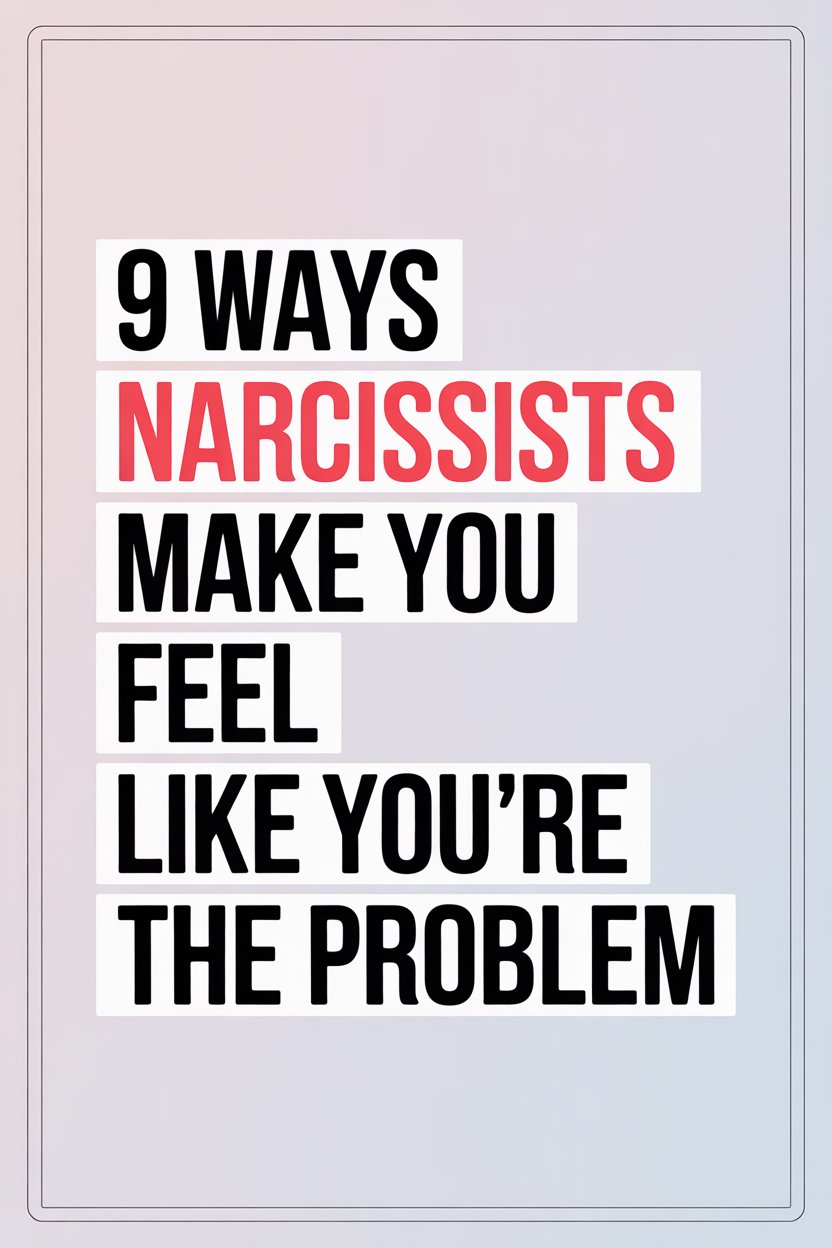Ever had an argument that left you apologising for things you hadn’t even thought of, while your partner skipped off whistling, utterly unbothered?
Welcome to the narcissist’s masterclass in mind-bending reality, where you’ll be starring as “The Problem” in every episode.
Narcissists have a black belt in emotional jiu-jitsu, flipping your concerns right back at you until you’re not sure if you’re arguing about dirty dishes or the fall of Rome.
If you’ve ever walked away from a conversation feeling like you need to Google “Am I actually the villain?” then this is your sign—it’s not you.
Let’s yank the curtain back on nine classic narcissist tactics guaranteed to have you doubting your own shadow.
1. Gaslighting Until You See Double
If you think you remember something clearly, a narcissist is here to assure you that you absolutely don’t. Their memory, apparently sharper than a trivia champion’s, will directly contradict yours—no matter how sure you are.
You mention a cruel comment from yesterday, they tell you it never happened. You recall agreeing on something, but now you’re “making things up again.”
This relentless rewriting of history isn’t just annoying, it’s designed to have you second-guessing every instinct. Suddenly, you’re apologising for being “paranoid” when, really, you just remembered Tuesday correctly.
Reclaim your reality: Start keeping notes or texts for yourself. It’s not paranoid, it’s self-defence for your sanity.
2. Blame-Shifting Like It’s an Olympic Sport
Narcissists can turn any situation into your fault with the agility of a cat leaping onto fresh laundry.
Burnt dinner? Clearly, your recipe was doomed from the start. They snapped at you? Must be because you were “nagging,” despite merely breathing in their vicinity.
The goal isn’t just to avoid responsibility—it’s to make you carry the emotional baggage for both of you. If you say “I feel hurt,” you’ll get “Well, if you weren’t so sensitive…”
Name the behaviour: Try calmly saying, “I notice every time I express something, it turns into my fault.” Watch the squirming begin.
3. Playing the Victim Like an Oscar Nominee
When all else fails, cue the crocodile tears. Suddenly, the narcissist is the world’s most misunderstood soul, wounded by your “unreasonable expectations.”
The garden-variety guilt trip turns into an epic journey: “I try so hard, but nothing I do is ever good enough for you.”
You might find yourself comforting them after they’ve upset you, which is like bringing soup to the burglar who just robbed your house because he “had a hard day.”
Resist the guilt: Your feelings are valid, even if theirs are always bigger and louder.
4. Selective Amnesia When It Suits
Somehow, every single agreement, boundary, or heartfelt conversation you’ve ever had gets wiped from their memory at precisely the wrong time.
Forgot your birthday? Oops, work was busy. Broke the same promise for the 19th time? Didn’t you say that was fine?
They only remember the things that benefit them, and nothing else—creating an ever-changing rulebook that keeps you off-balance.
Keep a record: Calendars, texts, or emails can be your best friend here. Not for them, for you, when you start doubting yourself.
5. Projecting Their Flaws Onto You
Narcissists have a magical ability to spot their own bad behaviour—when it’s supposedly coming from you. Cheating? Suddenly, you’re the “suspicious” one.
Rude comments? Apparently, you “always attack them.” Projecting is their hobby, and you’re the canvas.
This trick works because it puts you on the defensive, scrambling to prove you’re innocent rather than questioning their actions.
Flip the script: Instead of getting tangled up in protests, ask, “Why do you feel that way about me?” Watch as the logic cartwheels off a cliff.
6. Triangulating With Others
If you thought your relationship was just between two people, surprise! There’s a chorus of “supporters” popping up, often in the form of friends, family, or even total strangers who “agree” with the narcissist.
You’ll hear lines like “Everyone thinks you’re overreacting,” or “Even my mum says you’re difficult.” Suddenly, it’s not just you versus them, it’s you versus the world—at least according to them.
Don’t buy the hype: If these mysterious “others” never actually appear, they’re likely as real as unicorns on roller skates.
7. Withholding Affection and Approval
Affection, praise, and basic kindness become reward tokens handed out only when you’re acting the way they want. Step out of line, and suddenly, you’re in the coldest emotional Siberia this side of the Arctic.
You’ll find yourself working double-time to “earn back” their warmth, convinced their frosty silence must be your fault.
Set your own thermostat: Their mood swings aren’t your temperature check. You deserve kindness even when you’re not tap-dancing for approval.
8. Minimising Your Feelings
No matter how hurt, angry, or frustrated you feel, a narcissist will tell you it’s not that serious. “You’re too sensitive.” “It was just a joke.” “Don’t be so dramatic.”
Before you know it, you’re apologising for being human, while they get the emotional immunity of a rock.
Trust your gut: If you feel it, it matters. Sensitivity is not a crime, and comedy isn’t a blanket excuse for cruelty.
9. Moving the Goalposts
Narcissists are world-class at changing expectations without warning. You think you’ve worked out the rules, but every time you meet their standard, it shifts three feet to the left.
Now you’re “not supportive enough,” “too demanding,” or “never happy.”
This leaves you in a permanent state of chasing approval you’ll never quite catch—a hamster wheel powered by confusion and self-doubt.
Call out the shift: Say, “I thought we agreed on this, but now it’s changed. Can you help me understand why?” You might get a blank stare, but at least your sanity stays intact.
Reclaiming Your Confidence
Being made to feel like the problem—day in and day out—chips away at your confidence until it’s thinner than your patience on a bad Monday.
Narcissists thrive when their partners are anxious, insecure, and apologising for things that never happened.
Spotting these tactics is the first step to stepping off the crazy train. Self-doubt might be contagious, but so is self-awareness.
Share your experiences with someone who gets it—a friend, therapist, or that one aunt who always tells it like it is.
You’re allowed to set boundaries. You’re allowed to remember things accurately. You’re allowed, astonishingly, to not be the problem. That’s the secret they don’t want you to know.
And if all else fails, invest in good noise-cancelling headphones and the world’s most dramatic eye roll.
Some battles are best left unfought—especially when the only thing at stake is your peace of mind.


